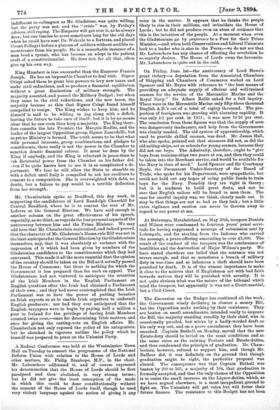On Friday, June 1st—the anniversary of Lord Howe'fp great victory—a
deputation from the Associated Chambers' of Shipping and Chambers of Commerce waited on Lord' Spencer and Mr. Bryce with reference to "the best means of' providing an adequate supply of efficient and well-trained seamen for the service of the Mercantile Marine and the- Royal Navy." Sir Albert Rollit asked for a full inquiry. There were in the Mercantile Marine only fifty-three thousand, English A.B.'s out of a total of eighty thousand. The pro- portion of foreigners was growing with alarming rapidity. It wasonly 4.2 per cent. in 1851; it was now 1616 per cent.. The conclusion from these figures was that the supply of men was dangerously inadequate, and help from the Government was clearly needed. The old system of apprenticeship, which' used to provide skilled seamen, was dead. Mr. James Hall,. who also spoke, pointed out that steamers did not, as did the old sailing-ships, act as schools for young seamen, because they did not use boys. The Admiralty, therefore, ought to " give boys from training-ships two years at sea, and then they could be taken into the Merchant service, and would be available for- the Navy in time of need." Lord Spencer and Sir Courtenay Boyle, the Permanent Under-Secretary of the Board of Trade, who spoke for his Department, were sympathetic, but could not hold out any hopes of using public funds to train boys for the Navy. Possibly they are right in theory ; but it is madness to build great fleets, and not be' sure that English sailors will be found to man them. The case for careful inquiry was, we think, clearly made out. It may be that things are not so bad as they look; but a little extra vigilance and caution can never be thrown away in regard to our power at sea.






































 Previous page
Previous page